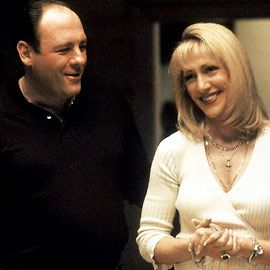
Introduction: A TV Revolution Led by ‘The Sopranos’ and ‘The Wire’
When we look back at the evolution of television, two iconic series stand out: ‘The Sopranos’ and ‘The Wire’. These shows weren’t just good television—they were transformative, setting the stage for what we now know as “peak TV.” If you’re wondering how these groundbreaking dramas helped shape the television landscape we know today, you’ve come to the right place.
But what exactly does “peak TV” mean? It’s the golden age of television, a time when TV shows rose to cinematic heights, not only in terms of production quality but also in storytelling, character depth, and cultural impact. Today’s TV audiences are accustomed to intricate plots, complex characters, and thought-provoking themes. But before the era of ‘Breaking Bad’, ‘Game of Thrones’, and ‘Mad Men’, it was ‘The Sopranos’ and ‘The Wire’ that laid the groundwork for these modern-day TV masterpieces.
In this article, we will explore how these two revolutionary shows changed the television industry forever, paving the way for the high-quality programming we now see across various platforms.

The Emergence of Peak TV: What Made ‘The Sopranos’ and ‘The Wire’ So Special?
What is “Peak TV” and How Did ‘The Sopranos’ and ‘The Wire’ Lead the Way?
To understand the lasting impact of ‘The Sopranos’ and ‘The Wire’, it’s important to grasp the concept of “peak TV”. The term refers to the dramatic rise in the quality of television shows that started in the late 1990s and early 2000s, where creators pushed the boundaries of storytelling, production value, and character development.
‘The Sopranos’ (1999–2007) and ‘The Wire’ (2002–2008) are often credited with kicking off this revolution. These two shows did what many thought impossible for TV: they raised it to the same level as feature films, both in terms of artistic quality and cultural significance. The groundwork they laid has influenced the explosion of high-quality television content that we binge-watch today.
‘The Sopranos’: A Masterclass in Storytelling and Character Depth
There’s no denying that ‘The Sopranos’ was a trailblazer in the world of television. It wasn’t just about a mob boss—it was about the complex psychology behind a mob boss. The show focused on Tony Soprano, a New Jersey mafia boss trying to balance his criminal empire with his personal life, leading to deep, philosophical explorations of morality, family, and identity.
By presenting these complex themes, ‘The Sopranos’ broke away from traditional crime dramas. The show’s intricate character studies and exploration of the human psyche led to a seismic shift in how characters were written. Viewers were no longer satisfied with simple good-vs-evil storylines. They wanted morally ambiguous characters who challenged their perceptions of right and wrong.
The Influence of ‘The Sopranos’ on Modern TV Writing
‘The Sopranos’ changed the way TV writers approached character development. Tony Soprano was not just a villain or a hero; he was a deeply flawed and relatable character with internal struggles that made him captivating. The show’s ability to blend dark humor, emotional depth, and psychological complexity was unprecedented.
Fast-forward to shows like ‘Breaking Bad’ and ‘Better Call Saul’, where complex, morally gray characters became the focal point. These shows owe a huge debt to ‘The Sopranos’ and its ability to make audiences care about characters that were once seen as irredeemable.
‘The Wire’: A Gritty, Realistic Depiction of Baltimore’s Struggles
If ‘The Sopranos’ focused on the individual’s psyche, ‘The Wire’ took on the grander, socio-political view. The show, which aired on HBO from 2002 to 2008, chronicled the interconnected lives of law enforcement, drug dealers, teachers, and politicians in Baltimore, Maryland.
A Realistic Look at Urban America
Unlike most crime dramas, ‘The Wire’ was not interested in romanticizing the drug trade or glorifying the lives of criminals. Instead, it painted a stark, often uncomfortable picture of the systemic issues facing cities like Baltimore: poverty, corruption, broken institutions, and racial inequality. The show became a canvas for social commentary, and it didn’t shy away from showing how these issues affected everyone—from the cops to the criminals, from the politicians to the children.
‘The Wire’ Redefined What a Crime Drama Could Be
What set ‘The Wire’ apart from other crime dramas was its unflinching realism and deep dive into urban poverty. It wasn’t just about solving crimes or catching bad guys—it was about understanding the root causes of social and systemic failures. The series was praised for its nuanced portrayal of Baltimore’s problems, and it raised the bar for how television could address complex societal issues.
Much like ‘The Sopranos’, ‘The Wire’ reshaped how writers and producers approached the medium. Rather than relying on quick thrills and clear resolutions, the show embraced ambiguity and slow-burning plots that challenged the audience’s expectations.
How ‘The Sopranos’ and ‘The Wire’ Paved the Way for Peak TV
Raising the Bar for Writing, Acting, and Production
The unprecedented quality of both ‘The Sopranos’ and ‘The Wire’ is often credited with the rise of peak TV. Both shows demonstrated that television could be as intellectually stimulating and artistically significant as cinema. The writing was sharp and sophisticated, the acting was on a whole new level, and the production values were stunning.
Today’s shows, like ‘Succession’, ‘True Detective’, and ‘Ozark’, continue the legacy of these two groundbreaking series. These newer shows build on the framework established by ‘The Sopranos’ and ‘The Wire’, offering intricate plots and morally complex characters that keep viewers coming back for more.
The Shift to Serialized Storytelling
One of the lasting impacts of ‘The Sopranos’ and ‘The Wire’ was the shift toward serialized storytelling. In contrast to traditional episodic shows where each episode was self-contained, these series told long-form, ongoing stories that stretched across multiple seasons. This allowed for deeper character development, more intricate plots, and the ability to explore themes over extended periods.
This shift in narrative structure can be seen in many popular shows today. ‘Game of Thrones’, ‘Stranger Things’, and even streaming giants like Netflix have embraced this serialized format, where seasons are designed to build on one another and lead to more substantial, long-term character arcs.
Why ‘The Sopranos’ and ‘The Wire’ Are Still Relevant Today
Timeless Themes and Universal Appeal
Even years after their original air dates, both ‘The Sopranos’ and ‘The Wire’ continue to resonate with audiences. Why? Because the themes explored in both shows are timeless and universal. Whether it’s the struggle for power, identity, or justice, these shows still speak to the core of human experience.
Their relevance is also amplified by the way they mirror ongoing societal struggles, from political corruption to the opioid crisis. While the shows may have aired years ago, they continue to inform conversations about race, class, and systemic failure in the modern world.
Conclusion: The Legacy of ‘The Sopranos’ and ‘The Wire’
In conclusion, ‘The Sopranos’ and ‘The Wire’ didn’t just push the boundaries of what television could be—they changed the entire landscape. By exploring complex characters, deep socio-political issues, and innovative storytelling methods, these shows paved the way for the era of peak TV that we live in today. They set the bar for modern TV, inspiring the creation of countless memorable and thought-provoking series.
As we continue to witness the rise of high-quality television, it’s clear that ‘The Sopranos’ and ‘The Wire’ are not just cornerstones of TV history—they’re the foundation upon which the golden age of television was built.
FAQs
1. How did ‘The Sopranos’ change TV?
‘The Sopranos’ changed TV by introducing complex characters with moral ambiguity and storylines that explored psychological depth. It blurred the lines between good and evil, creating a new way of looking at TV characters.
2. What made ‘The Wire’ different from other crime dramas?
Unlike other crime dramas, ‘The Wire’ focused on the systemic issues in Baltimore